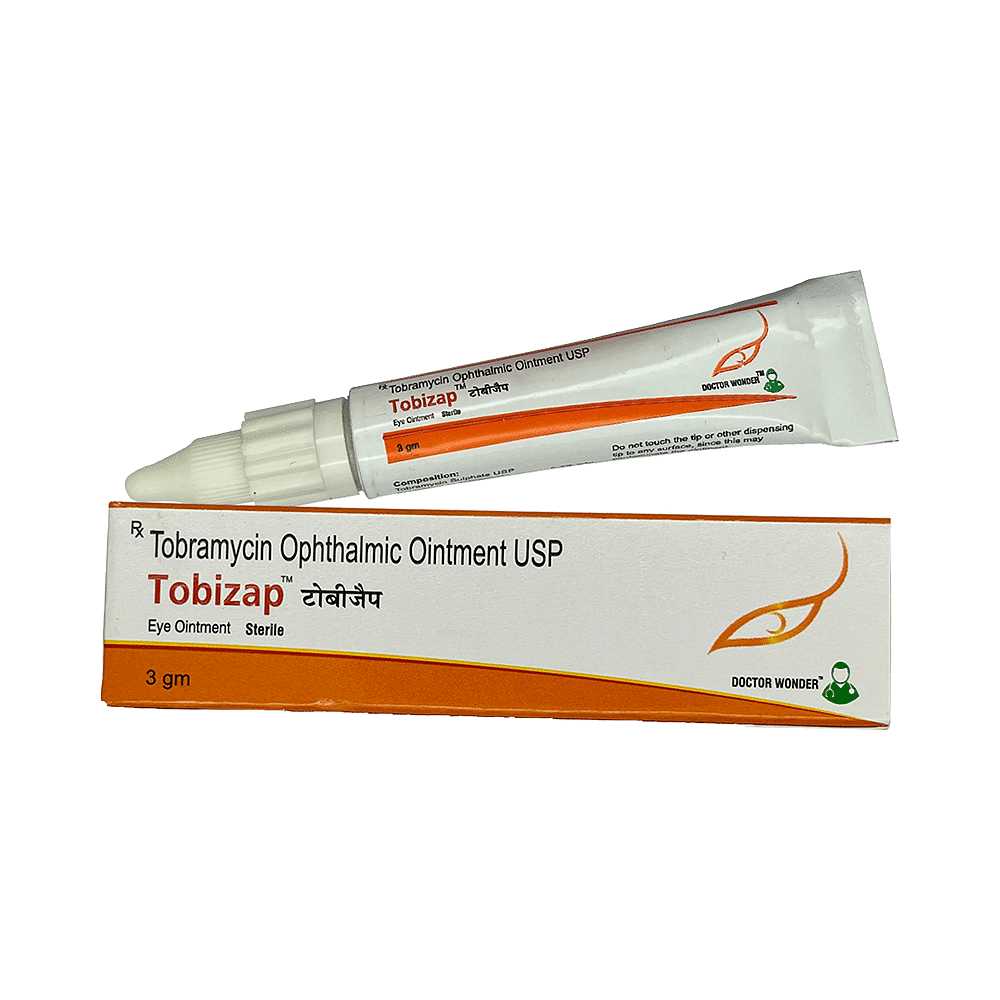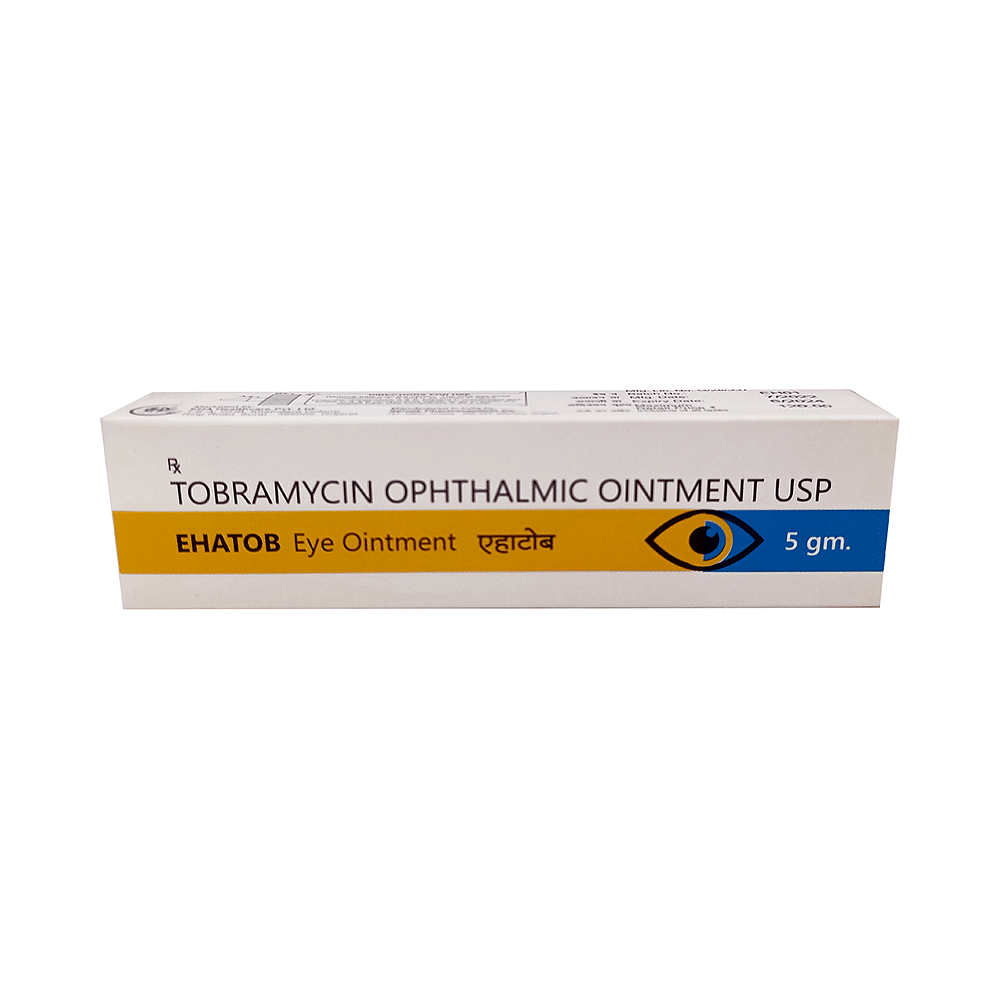
Nayantob 0.3% Eye Ointment
Manufacturer
Chethana Pharmaceuticals
Salt Composition
Tobramycin (0.3% w/w)
Key Information
Short Description
Nayantob 0.3% Eye Ointment is an antibiotic medicine used to treat bacterial infections of the eye and eyelids, and may also help prevent infection after an eye injury or surgery.
Dosage Form
Eye Ointment
Introduction
Nayantob 0.3% Eye Ointment is an antibiotic medicine that is used to treat bacterial infections of the eye (e.g., conjunctivitis) and the eyelids (e.g., blepharitis). It may also help to prevent an infection after an eye injury or surgery.
Directions for Use
This medicine is for external use only. Take it in the dose and duration as advised by your doctor. Check the label for directions before use. Hold the tube close to the eye without touching it. Gently squeeze the tube and place the medicine inside the lower eyelid.
How it works
Nayantob 0.3% Eye Ointment is an antibiotic. It stops bacterial growth in the eye by preventing synthesis of essential proteins required by bacteria to carry out vital functions. This treats your eye infection.
Quick Tips
Your doctor has prescribed Nayantob 0.3% Eye Ointment to treat bacterial infections of the eye. Do not skip any doses and finish the full course of treatment even if you feel better. Nayantob 0.3% Eye Ointment may cause damage to cornea on long-term use. Apply pressure on the corner of the eye (close to the nose) for about 1 minute immediately after instilling the drop. Wait for at least 5-10 minutes before delivering the next medication in the same eye to avoid dilution. Stinging sensation may occur for 1-2 mins. Notify your doctor if it persists for longer. Nayantob 0.3% Eye Ointment may cause damage to cornea on long-term use. Make sure to use it within 4 weeks of opening the bottle.
Related Medicines

Obra Eye Ointment

Tobanox Eye Ointment

Rebrex Eye Ointment

Tobram Eye Ointment

Nayatob 0.3% Eye Ointment

Zentob Eye Ointment

Tobizap Eye Ointment

Tojawa Eye Ointment

Ehatob Eye Ointment

Tobagen 0.3% Eye Ointment
Frequently asked questions
What bacteria does Nayantob 0.3% Eye Ointment kill?
Nayantob 0.3% Eye Ointment is effective against a broad spectrum of bacteria. The specific bacteria killed can vary based on the individual patient and infection, and will be determined by your doctor after considering various factors like severity of infection and potential antibiotic resistance. It is important to note that Nayantob 0.3% Eye Ointment must only be used against susceptible bacteria.
How long should I use Nayantob 0.3% Eye Ointment?
The duration of treatment will vary depending on the severity of infection and your doctor's judgment based on your individual condition. Your doctor will prescribe a specific treatment plan for your situation, which may involve a range of instructions regarding frequency and duration of use. It is crucial to follow your doctor's advice exactly, as prescribed.
How should Nayantob 0.3% Eye Ointment be used?
Before using Nayantob 0.3% Eye Ointment, ensure your hands are thoroughly washed. Avoid touching the dropper tip to your eyes or any other surfaces and maintain a hygienic approach throughout the application process. After tilting your head slightly, instill one drop of Nayantob 0.3% Eye Ointment into your affected eye for at least two minutes. Maintain this position, avoiding blinking, squinting, or touching your eyes during this time. Gently press your finger to the inside corner of your eye for about one minute. If you are using more than one drop, wait approximately five minutes before instilling subsequent drops.
What if I don't get better after using Nayantob 0.3% Eye Ointment?
If your symptoms do not improve after completing the prescribed treatment, it is essential to inform your doctor immediately. Additionally, informing your physician about any worsening of symptoms during the course of treatment is crucial for proper diagnosis and follow-up care.
Can I stop using Nayantob 0.3% Eye Ointment when I feel better?
No, you should not discontinue Nayantob 0.3% Eye Ointment without consulting your doctor. Even if you start feeling well, it's important to continue treatment for the full duration prescribed by your doctor. This is because complete eradication of infection might take time.


